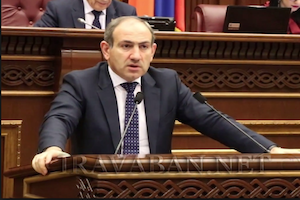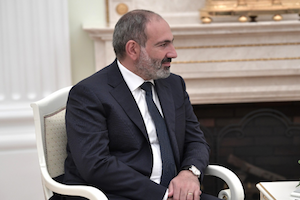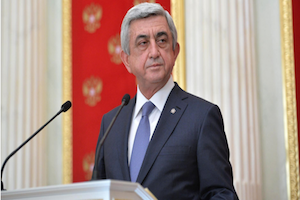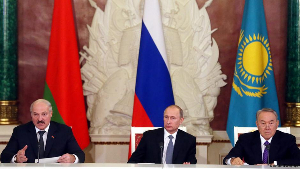Armenia's New Government Struggles with Domestic and External Opposition
By Armen Grigoryan
March 20, 2019, the CACI Analyst
After winning an overwhelming majority at the snap parliamentary elections in December, Armenia’s Prime Minister Nikol Pashinyan has formed a new cabinet and presented its program. While Pashinyan enjoys a high level of public approval, probably the most serious challenge awaiting his cabinet in the coming months is withstanding the massive campaign by the former regime’s proxies to undermine the government’s credibility in order to avoid the prosecution of some top-level former officials and to prepare the ground for their possible return to power. Speculations about the possibility of unilateral concessions on the Nagorno-Karabakh issue have been at the center of the campaign.

Armenia's New Government Faces Resistance
By Armen Grigoryan
November 7, 2018, the CACI Analyst
An alliance formed around Prime Minister Nikol Pashinyan’s Civic Contract party won an overwhelming majority in the Yerevan city council elections, despite an ongoing smear campaign by media controlled by the Republican Party of Armenia (RPA), former president Robert Kocharyan, and their proxies. The election results substantiated Pashinyan’s determination to dissolve the National Assembly and to hold snap parliamentary elections in December. Despite the confrontational campaign by the RPA and its allies, and their attempts to discredit the government and obstruct investigations into the actions of several former officials, Pashinyan’s high popular support seems enough to advance his political agenda.

Azerbaijan's New Cabinet Composition Indicates Pro-reform Agenda
By Fariz Ismailzade
May 11, 2018, the CACI Analyst
The appointment of a new Prime Minister and the new composition of the Cabinet of Ministers of Azerbaijan have raised hopes for speedy economic reforms and liberalization of the national economy. New, young and foreign-educated ministers are expected to create more transparency and accountability in the system, create a more attractive business climate and further ensure the sustainable development of the country. President Aliyev’s new appointments have been welcomed by the public and foreign investors, and hint at the urgent need to deepen the pace of reforms.

Armenia's Prime Minister Resigns Amid Extensive Protests
By Armen Grigoryan
May 2, 2018, the CACI Analyst
A predictable attempt by Armenia’s former President Serzh Sargsyan to continue ruling the country as prime minister after the transition to a parliamentary system triggered a massive protest campaign. Despite previous experiences of rather unsuccessful protests, often violently suppressed by police, a new protest movement managed to mobilize wide public support. On April 23, six days after his appointment as prime minister, Sargsyan resigned in the face of mass protests and a civil disobedience campaign. The protest actions will likely continue, with demands including the appointment of an opposition representative as the head of a provisional government and snap parliamentary elections.

The Eurasian Economic Union – Implications for Governance, Democracy and Human Rights
By Daniel Linotte (12/10/2014 issue of the CACI Analyst)
In January 2015, a new regional agreement will enter into force between Belarus, Kazakhstan and Russia – it will create the so-called Eurasian Economic Union (EEU), replacing the Eurasian Economic Community (EEC) established in 2006. Taking into account actual trade flows and national economies, the EEU can hardly be justified and should not have much impact on economic integration among its members. Nevertheless, Western countries should still be worried about possible non-economic consequences of the new agreement, especially for governance, democracy and human rights, in countries that are already displaying authoritarian tendencies.




